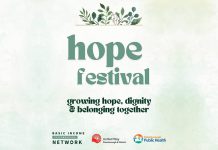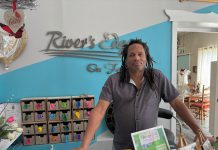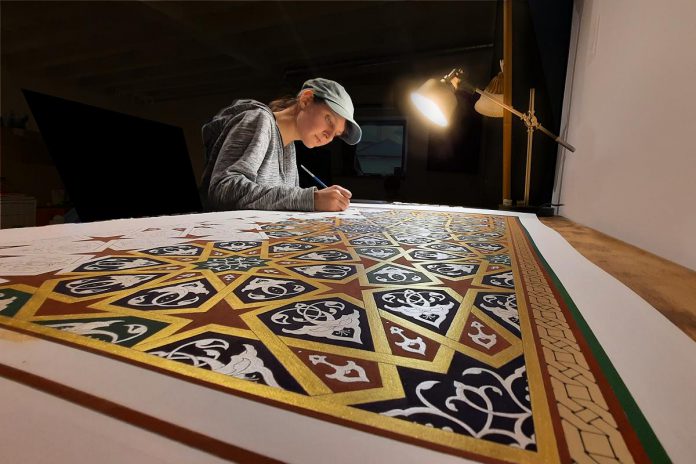
When Nogojiwanong-Peterborough artist Gillian Turnham first encountered Islamic tradition in 2012, it wasn’t something she initially explored artistically. Her engagement with the geometric patterns in the Islamic artistic tradition came later, stemming from an exploration of esoteric Islam.
By the time Turnham came across and became curious about Islamic geometric patterns — what drives them and how they are constructed — she had established art design and Islamic tradition with separate roots. Nevertheless, from first working with her hands as a child in England, to designing and building art in the PCVS arts program in Peterborough, to her focus on architecture and ornamental art after graduating from the Nova Scotia College of Art and Design, the turn to traditional Islamic art was a natural extension of her creative life.
“It opened up a whole entire world for me,” Turnham recalls. “And since that point, almost everything I’ve done artistically has been Islamic geometry.”
VIDEO: Samples of Gillian Turnham’s work
Turnham hopes to open that world for listeners with a six-episode radio series she is producing during her Trent Radio “Your Radio is Their Stage” artist residency. The radio series will be broadcast on Sunday (February 6) and explore the theory, symbolism, and cultural context behind traditional Islamic art.
“I think there’s a growing interest, but also a lack of basic contextual literacy and understanding in how to view contemporary traditional art,” says Turnham. “Peterborough is becoming more diverse in our demographics. I think it’s good to gain some literacy in other artistic traditions and other ways of thinking about the world, especially now that there is a lot more interest in things like mandalas and yoga and meditation.”
“For these traditional aspects that we’re bringing into contemporary life, it’s important to have a framework for engaging with them that is respectful and genuine and culturally appropriate,” she adds.
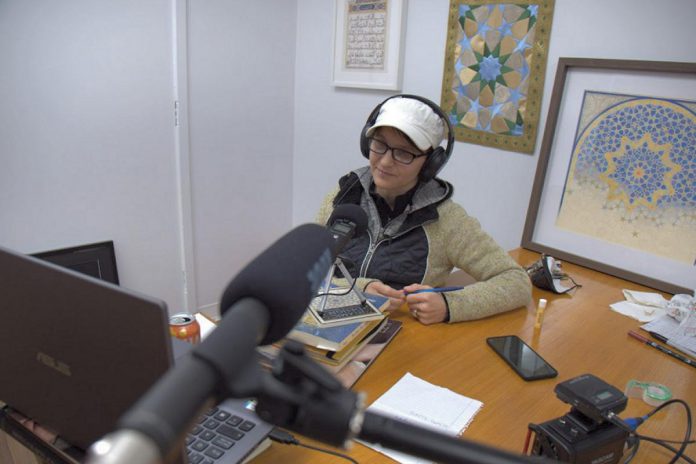
Before exploring Islamic traditions, much of Turnham’s artistic grounding looked to European and Western traditions. Since practising traditional Islamic art, she’s noticed that many people have a growing interest in the form and patterns, but lack understanding of its framework.
For instance, Turnham says traditional art is treated differently in the West because of differences in ideology about progress and time.
“We think about traditional arts as existing in museums, or being something that we need to preserve, rather than being something alive and meaningful in a contemporary sense,” she explains.
For Turnham, when the opportunity came to transfer her artistic practice into audio with her “Your Radio is Their Stage” artist residency at Trent Radio, that meant sharing the cultural traditions and contexts from which her work derives meaning. Through the residency, Turnham has received mentorship, equipment, training, and support to develop the radio series.
“It’s a relatively standard talk radio format, in which I bring on a number of guests to the show and we discuss various topics within Islamic art rooted very much in the experience of contemporary artists working in the field today,” Turnham says. “We also explain some of the history and give the background context for people who might not have encountered this before.”
The topics to be covered within the series, which is called ‘Beauty, Goodness, Truth’, include:
- What is Islamic art and why is it experiencing a revival today?
- What is the role of digital technology in Islamic art today?
- How are unity and diversity expressed within the tradition?
- Are figurative images banned in Islamic art?
- What have been the roles of guilds in the past, and could they be revived today?
- How does the way we conceptualize and teach number/geometry today differ from the past?
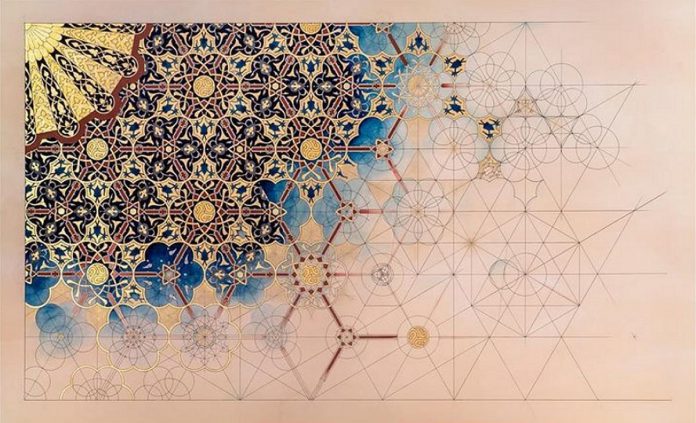
Turnham put a lot of thought into the structure and formulation of the series. Six one-hour episodes is not a lot of time, considering Turnham’s nine years of research on the topic.
“There was a lot of formulation in terms of all the information that I wanted to get across and how I could structure that,” Turnham says. “They’re not scripted — they’re all spontaneous conversations.”
The series features conversations with Adam Williamson, Ameet Hindocha, Eman Hijazi, Paul Barchilon, and Samira Mian, many of whom live in different countries. Figuring out how to get a high-quality audio recording of Zoom conversations with people from around the world was an added challenge for Turnham’s project, although she prevailed.
“I have been finding it a little more intuitive than I thought that I would,” Turnham says. “I’ve had great support from Trent Radio and from Laurel Pollock on that regard as well.”
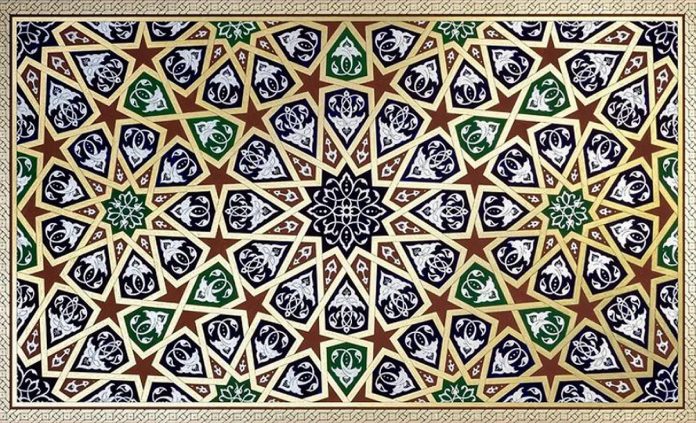
Turnham has created show notes for listeners of the series, which will be available on her website at www.gillianturnham.com. For each episode, listeners will find visuals and further readings on the topics discussed.
While this is her first time learning audio as a medium, it is not the first time Turnham has shifted her artistic practice to a new medium. Originally a fine-metal sculptural artist, she expanded her artistic practice to work with wood and stone as well as hand-pierced metal, creating miniature sculptural works that explored elements of structure and traditional patterns.
She then became interested in tessellation — covering a surface with geometric shapes with no gaps or overlaps — and, in 2014, began focusing on the complex geometric patterns of the Islamic tradition. Turnham recently spent three years in southern Spain, where she immersed herself in the study of the Islamic geometric tradition. There, she created hand-sewn tapestries and original drawings and designed a series of mechanical clocks that incorporate traditional Islamic geometric patterns with other tessellating forms.
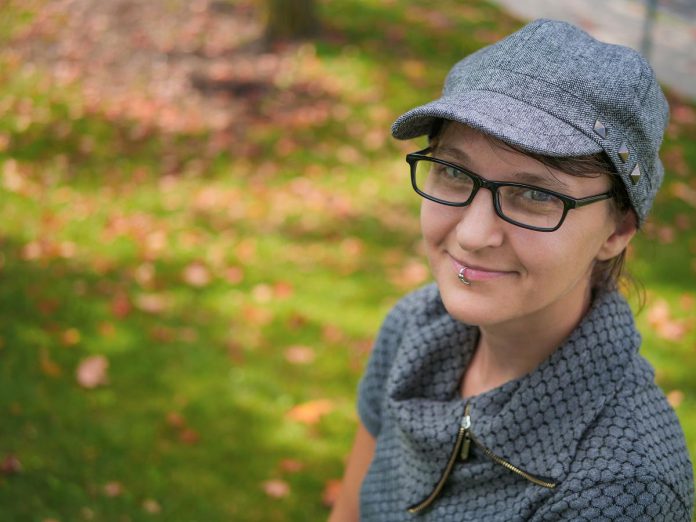
Since the pandemic, her artistic expression of the Islamic tradition has been primarily through painting.
“With the pandemic and all of the lockdowns, I only had access to my domestic space,” Turnham explains. “Painting made a lot more sense within those confines, and it was something that I hadn’t been particularly gripped by before. By that point, my work was already very firmly rooted in Islamic geometry, and having the opportunity to explore that in painting was different from any previous experience.”
With its underlying mathematical framework, the geometry of Islamic art is based on simple forms that are combined, duplicated, and interlaced. The resulting intricate, symmetrical patterns represent unity and order while giving the artist an exceptional degree of flexibility and freedom of expression — an important balance according to Turnham.
“If you create a way of existing in the world that is connected to balance, it retains value without being in a constant process of change,” she says. “Change is inevitable. We don’t have to fight for that. But fighting for the connection — that essential harmonic resonance — has value now more than ever.”
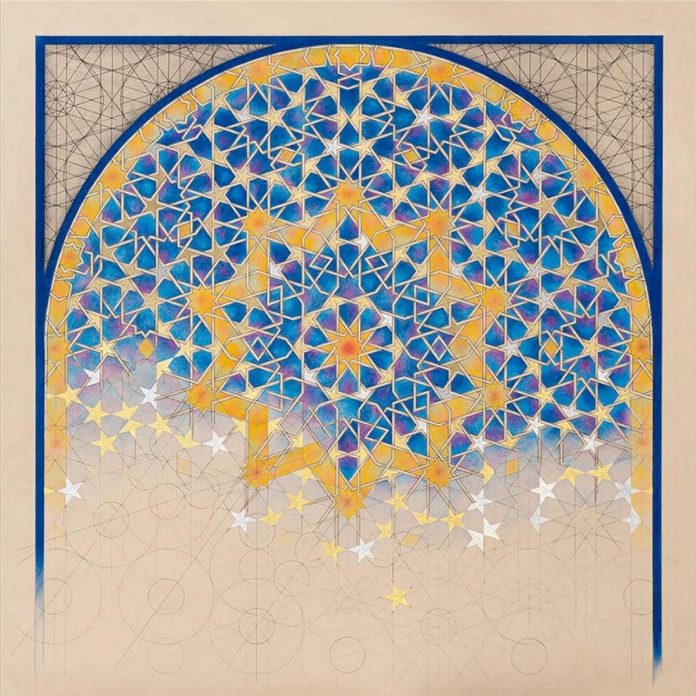
To learn more about Turnham’s traditional methods and designs, visit her website at www.gillianturnham.com. You can also follow her on Instagram @gillianturnham.
Turnham’s radio series is set to broadcast from 6 to 7:30 p.m on Sunday, February 6th on Trent Radio at 92.7 CFFF FM in Peterborough, 287 on Cogeco Cable, and online at www.trentradio.ca.
Trent Radio’s “Your Radio Is Their Stage” artist residency project runs until March 2022, with Turnham’s residency concluding on February 6.
Textile artist Melanie McCall was the first to complete her residency on October 17, followed by Jose Miguel Hernandez on November 14 and JoEllen Brydon on December 12. Gillian Turnham’s February 6 residency will be followed by John Marris (community arts). Poet Justin Million’s residency, originally scheduled from December 5 to January 9, is being rescheduled.
The reimagined work of all participating artists will also be broadcast in April 2022.
“Your Radio Is Their Stage” is made possible by the Community Radio Fund of Canada, the only organization mandated to support campus and community radio stations in Canada financially.
This story was created in partnership with Trent Radio, a producer-oriented broadcast facility that started as a Trent University student club in 1968. Sponsored and designed by students from Trent University, Trent Radio incorporated as a registered charity in 1978. Trent Radio currently holds a Community Broadcast License, and is a resource that is shared with the Nogojiwanong-Peterborough community.



